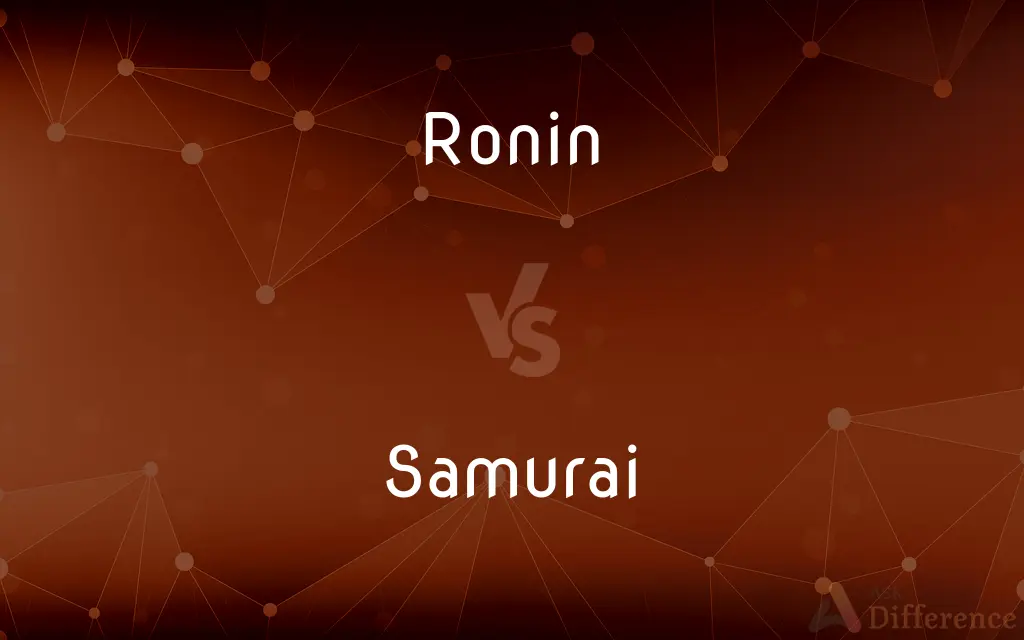Ronin vs. Samurai — What's the Difference?
Edited by Tayyaba Rehman — By Fiza Rafique — Updated on March 18, 2024
A ronin is a samurai without a lord or master during the feudal period of Japan, often due to the loss or fall of their lord, while a samurai is a member of the feudal Japanese warrior class, loyal to a lord and living by the Bushido code.

Difference Between Ronin and Samurai
Table of Contents
ADVERTISEMENT
Key Differences
The term "ronin" signifies a samurai who has lost his master or lord, rendering him masterless. This situation could arise from the death of the samurai's lord, the samurai's dismissal, or the dissolution of his lord's domain. Ronins often wandered Japan, offering their services as mercenaries, bodyguards, or taking up non-samurai vocations. On the other hand, a samurai was a warrior deeply integrated into the feudal system of Japan, serving a daimyo (feudal lord) or the shogun (military dictator). Samurai were bound by the Bushido code, which emphasized virtues such as loyalty, honor, and discipline. While a samurai's identity and social status were anchored in his allegiance to a lord and his adherence to Bushido, a ronin, lacking such ties, occupied a more ambiguous social position.
Ronins, being masterless, faced significant social and economic challenges. Without the support of a lord, they lacked the means for a stable livelihood and often lived in poverty. The absence of a master also meant that ronins were free from the strictures of the samurai code to some extent, allowing them more personal freedom but also placing them in a precarious social and legal position. Conversely, samurais enjoyed a status of respect and authority within Japanese society. Their relationship with their lord not only provided them with economic security and social standing but also defined their very identity and purpose within the feudal hierarchy.
The concept of a ronin has been romanticized in Japanese culture and literature, often portrayed as a wandering swordsman with a strong sense of justice, unbound by the constraints of fealty to a lord yet adhering to a personal code of honor. This contrasts with the samurai's portrayal, which, while also romanticized, emphasizes loyalty, sacrifice, and service within the framework of feudal loyalty and the Bushido code.
The distinction between ronin and samurai reflects the complexities of the feudal Japanese social structure, where shifts in power and allegiance could significantly alter an individual's status and role in society. The transition from samurai to ronin could be seen as a loss of social identity and stability, yet it also offered an opportunity for autonomy and redefinition of one's role in a rigidly structured society.
The rise and fall of the samurai class, culminating in the Meiji Restoration, which led to the abolishment of the feudal system and the samurai class itself, marked the end of the traditional roles of both samurai and ronin. However, their legacies continue to shape Japanese cultural identity, with each embodying different aspects of the ideals of bravery, honor, and individuality.
ADVERTISEMENT
Comparison Chart
Definition
A masterless samurai, often wandering and taking up mercenary work.
A feudal warrior loyal to a lord, living by the Bushido code.
Social Status
Ambiguous, often lower due to lack of lord's support.
High, respected within the feudal hierarchy.
Economic Stability
Lacking, due to absence of a lord's patronage.
Provided by their lord, along with land and stipends.
Freedom
Greater personal freedom, but with social and economic instability.
Less personal freedom, bound by duty and Bushido code.
Cultural Perception
Romanticized as independent and just, but also seen as tragic figures.
Romanticized as loyal, honorable, and disciplined.
Compare with Definitions
Ronin
A samurai without a master due to the loss or fall of their lord.
After his lord's defeat, he became a ronin, wandering the land.
Samurai
A warrior characterized by honor, discipline, and martial prowess.
He lived his life as a samurai, dedicated to the way of the warrior.
Ronin
Someone who operates independently, often in a freelance capacity.
In modern contexts, the term ronin can describe individuals who work independently of traditional employment structures.
Samurai
A member of the feudal Japanese warrior class, serving a lord and adhering to the Bushido code.
The samurai served his daimyo with unwavering loyalty.
Ronin
A freelance warrior or mercenary in feudal Japan.
As a ronin, he took on jobs that allowed him to uphold his sense of justice.
Samurai
In historical context, a noble in the service of a feudal lord, with military and administrative duties.
The samurai managed lands and collected taxes for his lord, in addition to his martial duties.
Ronin
A samurai who is not in the service of a feudal lord.
Samurai
A professional warrior belonging to this class.
Ronin
A masterless samurai (who often becomes a mercenary to make ends meet).
Samurai
Samurai (侍) were the hereditary military nobility and officer caste of medieval and early-modern Japan from the late 12th century to their abolition in 1876. They were the well-paid retainers of the daimyo (the great feudal landholders).
Ronin
A student who has failed the entrance examination for the high school or university of their choice: if the student does not wish to take the exam the following year or is unable to, the student becomes a ronin, assuming full responsibility for their own training and survival.
Samurai
The Japanese feudal military aristocracy.
Ronin
In Japan, under the feudal system, a samurai who had renounced his clan or who had been discharged or ostracized and had become a wanderer without a lord; an outcast; an outlaw.
Samurai
In feudal Japan, a soldier who served a daimyo.
Samurai
A Japanese warrior who was a member of the feudal military aristocracy
Samurai
Feudal Japanese military aristocracy
Common Curiosities
What caused a samurai to become a ronin?
A samurai could become a ronin due to the death of his lord, dismissal from service, or the dissolution of his lord's domain.
What was the Bushido code?
The Bushido code was the ethical code of conduct for samurais, emphasizing virtues like loyalty, honor, and discipline.
Did ronin follow the Bushido code?
While some ronin adhered to their personal interpretations of Bushido, their status as masterless made strict adherence to the code more complex.
How were samurais compensated for their service?
Samurais were typically compensated with land, stipends, and rice allowances provided by their lords.
How did ronin make a living?
Ronin often worked as mercenaries, bodyguards, or in any available occupation that could sustain them.
What happened to the samurai class?
The samurai class was abolished during the Meiji Restoration as Japan modernized and abolished its feudal system.
What virtues did samurais and ronin value?
Both valued honor and bravery, though samurais also emphasized loyalty to a lord, while ronin had to navigate their independence.
Can the term "ronin" be used in modern contexts?
Yes, in modern usage, "ronin" can describe individuals who work independently, outside traditional employment structures.
Did all ronin become mercenaries?
Not all ronin became mercenaries; some found work in other fields, while others sought to serve new masters.
How is the legacy of samurais and ronin viewed today?
Their legacies are romanticized and respected, symbolizing Japan's historical ideals of bravery, honor, and individuality.
Share Your Discovery

Previous Comparison
Blench vs. Blanch
Next Comparison
Toadstool vs. MushroomAuthor Spotlight
Written by
Fiza RafiqueFiza Rafique is a skilled content writer at AskDifference.com, where she meticulously refines and enhances written pieces. Drawing from her vast editorial expertise, Fiza ensures clarity, accuracy, and precision in every article. Passionate about language, she continually seeks to elevate the quality of content for readers worldwide.
Edited by
Tayyaba RehmanTayyaba Rehman is a distinguished writer, currently serving as a primary contributor to askdifference.com. As a researcher in semantics and etymology, Tayyaba's passion for the complexity of languages and their distinctions has found a perfect home on the platform. Tayyaba delves into the intricacies of language, distinguishing between commonly confused words and phrases, thereby providing clarity for readers worldwide.















































